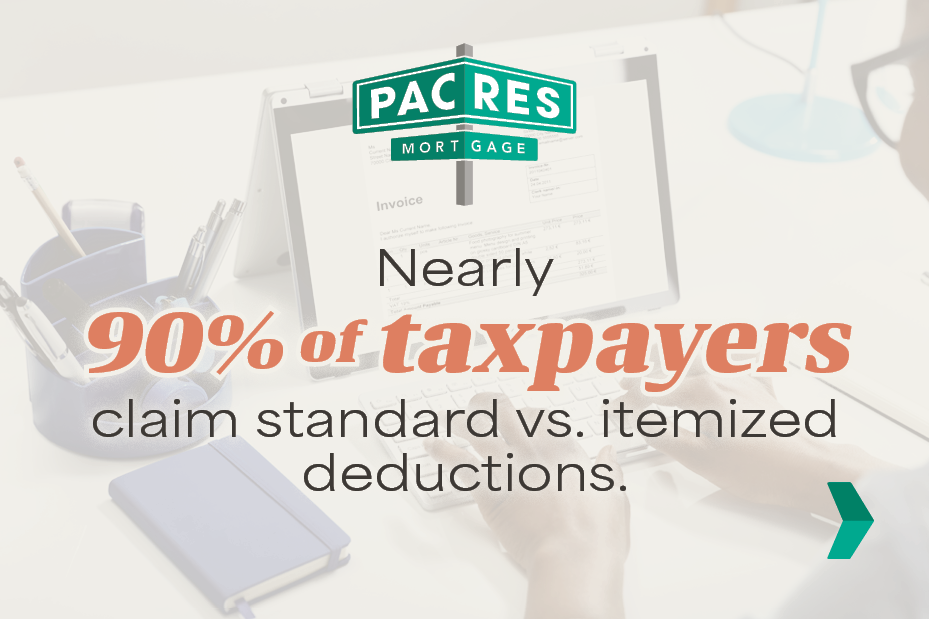Which is Better for You? Standard vs. Itemized Deductions
February 12, 2024 — 6 min read

Your cousin who bought a house once said the standard deduction is best, but is that true for you? When it comes to taxes, it’s important to grasp which deduction may optimize your refund or minimize the amount you owe.
Simply put, a deduction is an amount that is deducted from your taxable income; the choice between a standard and itemized deduction hinges on your unique financial fingerprint and long-term goals. Continue reading to gain a clearer understanding of the distinction between these two terms.
What is a Standard Deduction?
The standard tax deduction, a set dollar amount, lowers the taxable income for taxpayers and stands as the most widely utilized option. In fact, each year, nearly 90 percent of taxpayers choose to claim the standard deduction over itemizing their deductions. However, that doesn’t mean it’s the right option for everyone, and it may pay to put in the time to compare options.
The standard deduction:
- Helps you to claim a tax deduction even in the absence of qualifying expenses for itemized deductions.
- Eliminates the need for itemizing deductions
- You don’t have to keep detailed records and receipts of expenses in case of a tax audit

The standard deduction amount changes based on your filing status; here are the amounts for tax year 2024:
- For single taxpayers and married individuals filing separately, the standard deduction rises to $14,600 for 2024, an increase of $750 from 2023
- The standard deduction for married couples filing jointly for tax year 2024 rises to $29,200, an increase of $1,500 from tax year 2023
- For heads of households, the standard deduction will be $21,900 for the tax year 2024, an increase of $1,100 from the amount for the tax year 2023
By providing a set deduction amount, the standard deduction simplifies the tax filing process and can serve as a valuable tool for taxpayers seeking a hassle-free way to reduce their taxable income. It’s a good idea to consult with a trusted tax professional before making any big decisions.
What’s an Itemized Deduction?
While the standard deduction is a fixed amount, itemized deductions are a dollar-for-dollar reduction that varies from taxpayer to taxpayer. To arrive at your itemized deduction amount, you must aggregate all applicable deductions and subtract this sum from your taxable income.
Common itemized deductions include:
- Casualty and theft losses from a federally declared disaster
- Charitable donations
- Deduction for state and local taxes (if applicable)
- Gambling loss deduction (to the extent of gambling winnings reported on your tax return)
- Home mortgage interest
- Unreimbursed medical and dental expenses
By documenting and itemizing these qualifying expenses, taxpayers can potentially lower their taxable income, resulting in reduced tax liability. However, it's important to weigh the benefits of itemizing deductions against taking the standard deduction to determine the best choice for you. Consult with a trusted tax professional to receive personalized guidance on optimizing deductions within the bounds of tax regulations.
Advantages of itemized deductions:
Opting for itemized deductions could result in a sum surpassing the standard deduction. The greater the deductions, the lower your tax liability—an incentive for some individuals to itemize, as their total itemized deductions exceed the standard deduction.
Certain circumstances make itemizing particularly beneficial. For instance, homeowners may find itemizing appealing, as deductions for mortgage interest and property taxes may surpass the standard deduction.
Disadvantages of itemized deductions:
Understanding the rules is crucial, especially since some itemized deductions have specific requirements. For instance, medical expenses are deductible only if they exceed 7.5% of your adjusted gross income.
Itemizing may require additional time for your tax return preparation. You'll need to allocate extra time to complete Form 1040, Schedule A, and supporting schedules.
You need proof. You must substantiate your deductions by keeping organized records. If you typically take the standard deduction but plan to itemize next year, start saving receipts and proof for your deductions now.

How do You Choose Which Deduction to Claim?
Ultimately, it boils down to the amount that is most advantageous for you. If your itemized deductions exceed the standard deduction for your filing status, choosing to itemize can lead to a lower taxable income and potentially reduce your overall tax liability. On the other hand, if the standard deduction offers a higher benefit, it might be the more practical choice.
- Begin by calculating your itemized deductions. It’s important to recognize that some itemized deductions may be applicable to your state return even if they don't qualify for your federal return;
- then, use IRS Form 1040 – Schedule A: Itemized Deductions to calculate the specific amount of your itemized deduction.
- Compare this itemized deduction amount with the standard deduction associated with your filing status.
In certain scenarios, opting for itemization becomes a more logical choice. Here are some to consider:
- Your itemized deductions add up to an amount surpassing the standard deduction you would otherwise receive.
- Throughout the tax year, you incurred substantial unreimbursed medical and dental expenses paid out of pocket.
- You made payments for real estate taxes and home mortgage interest on your residence.
- You experienced significant, uninsured losses due to casualty events like fire, flood, or wind, or were a victim of theft in a federally declared disaster.
- Your gambling losses are considerable and you have enough gambling winnings to offset these losses.
- You made noteworthy charitable contributions.
- You qualify for other allowable deductions, such as impairment-related work expenses for a disabled individual or repaid amounts exceeding $3,000 subject to a claim of right.

Do You Pay State & Local Taxes?
Nearly everyone is subject to some form of state and local taxes. These may include:
Real estate taxes. If paid through an escrow account, refer to Form 1098 or your lender's year-end tax summary; if not, review property tax bills or canceled checks for a comprehensive total.
RELATED: Homebuying 101: What is an Escrow Account?
State and local income taxes. Add up he figures on your W-2 and any estimated tax payments made for this year's state return, including any additional payments sent with the prior-year return.
Sales tax. If your state and local sales tax exceeds income taxes, consider deducting it. Choose between deducting actual sales tax paid or estimating based on income and local sales tax rates.
Personal property taxes. Part of your annual car registration may be deductible. To qualify, the tax has to be based on the vehicle's value. Typically, you can find this on your registration or renewal notice.
Pro Tip: Combine your total state and local taxes (capped at $10,000) with the previously calculated mortgage interest. If this sum exceeds your standard deduction, opting for itemization may be the better option. However, every taxpayer’s situation is unique. Seek advice from a tax professional to receive personalized insights into maximizing deductions while adhering to tax regulations.
Ready for Next Steps?
Your future is our focus—no matter where you’re at in your homeownership journey, we’re here to help you take a confident next step. Get a free quote today, or connect with your neighborhood Mortgage Advisor.
Keywords:
Categories
Archives
Recent Posts
- No Down Payment for First-Time Homebuyers
- How Does A 30-Year Mortgage Work: A Simple Guide
- Your Comprehensive Homebuying Checklist: A Step-By-Step Guide
- Mortgage Pre-Approval: Everything You Need to Know
- What Are the Benefits of a USDA Loan for Homebuyers?
- How Many People Can Be On A Home Loan? Your 2024 Guide
You bring the dream. We'll bring the diagram.
There’s a financing solution for just about every situation.
I felt like I was treated like family, great communication and helping me with any questions I had.

You bring the dream. We'll bring the diagram.
There’s a financing solution for just about every situation.
Where does your sun shine? Find your local advisor.
Enter your city or state to see advisors near you.
